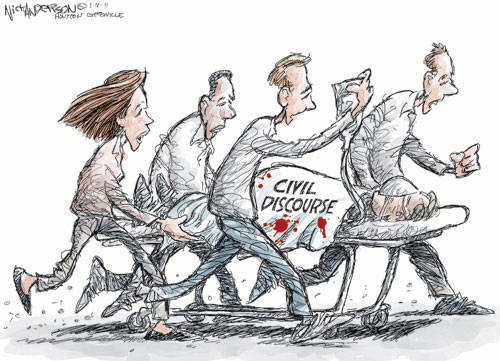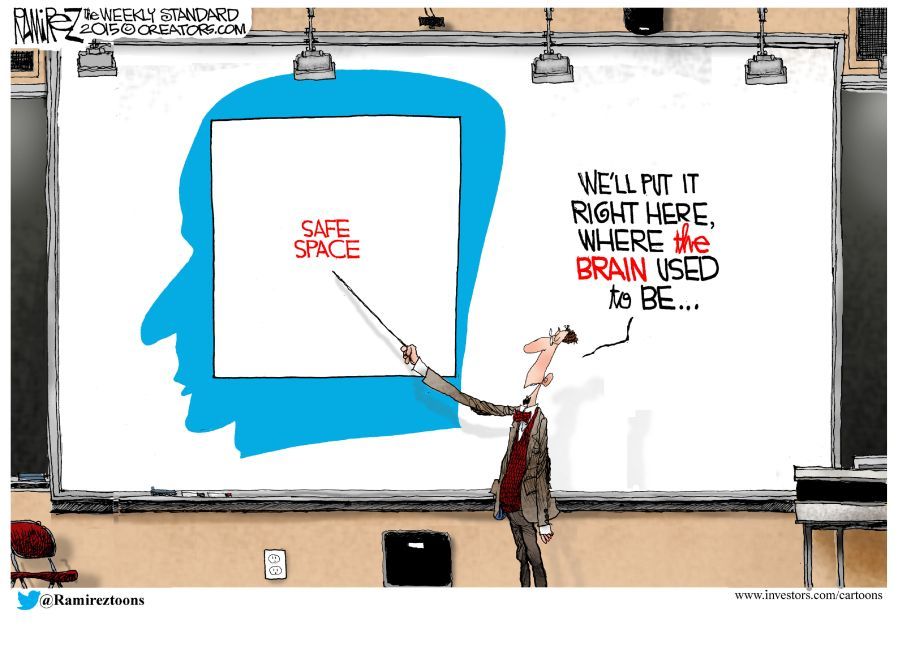
Discourse is nearly DOA in America
We’re killing it with fear-fueled anger and disrespect for opposing viewpoints. Honest discourse has been shackled by intolerance, ignorance, and name-calling. This is a relatively recent but dark phenomenon.
There was a stretch of time in our nation’s history—oh, about 224 years—when healthy discourse could be passionate—even heated. It could also be intelligent and sensible and helpful in hammering out good ideas while discarding bad ones.
It was a time when words meant what they mean. When they weren’t hurled about willy-nilly in fits of emotion-charged ignorance. During this relatively civil epoch, people were offended by libel and slander and profanity, not—horror upon horrors—by disagreement and logical, position-threatening argument.
Words were used to express ideas, not to name-call or as conversation enders. Where does one go in a spirited back-and-forth, when he’s called a “hater?” He’s stopped dead in his tracks and must circle back to defend himself rather than a point or position.
Here’s a scenario that I haven’t experienced, but that happens every day. Just plug in whatever hot issue you want; it’ll work. Here’s the scenario:
John, a racist xenophobic Islamophobic fascist Nazi “debates” Jill, an open-minded, big-hearted modern progressive thinker:
John: “Let’s talk about this. I don’t hate you or your opinion on this issue, I just—”
Jill: “Haters gonna hate.”
John: “What? No, I’m not hating ANYTHING here. What I’m saying is that I disagree with your take on the immigration hold because—”
Jill: “You’re spewing hate because you don’t like Muslims—you’re afraid of them. To me, you seem Islamophobic and bigoted. And racist.”
John: “What? What the … NO! I am NOT racist OR bigoted. I’m not afraid of Muslims. I’m just not sure the immigration hold is an evil idea. I just—hey, where are you going? I’m not trying to offend you—I just thought we could talk about this.”
Jill: “I’m sorry, I can’t talk with you. I AM offended. If you aren’t against the Muslim ban, you’re a fascist and a racist and a bigot. Just like that Hitler in the White House. Hater.”

Our lost words
Words like hate have lost their meaning. As has bigot, any type of real or fabricated phobia, fascist, Nazi, intolerance and others. Here are some examples of our lost words with original definitions crossed out followed by new, culturally correct ones:
HATE |hāt| verb
Opposition or disagreement to my firmly held belief about … anything |
BIGOT |ˈbiɡət| noun
a person who is intolerant toward MY opinion |
NAZI |ˈnätsē| noun
a person with extreme racist or authoritarian views (close, but …) a person with views I find extreme or that oppose mine in ways I “feel” are mean, black and white, narrow minded and intolerant (boom!) |
FASCIST |ˈfaSHəst| noun
a person who is extremely right-wing or authoritarian (almost there …) Trump |
INTOLERANCE|inˈtäl(ə)rəns| noun
the expression of backward, incorrect and extreme views, beliefs, or behavior that oppose my views, beliefs, or behavior |
DEBATE |dəˈbāt| noun
an argument that can be won by name-calling, fake news dissemination, misinformation, or vilification |
Our words have been warped and their meaning distorted to prop agendas. When this happens, they become meaningless. And without the objective ground rules that words and meaning provide, real discourse is impossible.
“Winning!”
We’re destroying discourse in America. No longer interested in civil give and take, we “win” arguments by vilifying opponents with toxic words. Instead of engaging opposition, we shout it down. Rather than persuade, we degrade. We don’t win over, we run over. Instead of listening, we filibuster.
Is it any wonder we’re divided, disillusioned and disappointed with our political system, our prospects as a nation, and our ability to communicate? The vitriol slung about in mainstream and social media belongs in fetid sewers not in news outlets, on Facebook and Twitter, or at protests.
Safe spaces?
Why is our civil discourse so uncivil? Here are some popular possibilities: liberal education, progressive leaders, entitled millennials, political polarization, political correctness, free speech-resistant college kids, helicopter parenting … yada yada.
What about safe spaces? This is a particularly puzzling construct this middle-aged writer finds virtually impossible with which to relate. I catch myself grumbling like an old guy on his porch watching a protest:
“Safe spaces? Whaddya want—a force field? Back in my day (insert old-man trill), your safe space was a tough constitution. Don’t agree with an argument? Win it by persuasion. Don’t be offended. Put on your big boy pants, punk. Safe spaces … pah! The only safe space you need is between your eyes and the back of your head.”

How did we become hypersensitive to points of view with which we don’t agree? Even I, a committed Gen Xer, have to resist the urge to tiptoe around feelings when discussing opposing opinions.
What are we so afraid of? If we believe strongly in our positions about important issues, we should be able to debate them with confidence AND passion. What happened to our ability to engage in respectful debate?
Here a truth, there a truth …
And now for the postmodern “truth” analysis. You knew it was coming. It has to. Here goes: All viewpoints are valid; truth is relative; therefore your truth is valid; my truth is valid. All truths are valid even—and especially—if two or more are diametrically opposed. Which means that as painful as it would be to Jill-of-the-open mind, John-the-Nazi’s truth is just as valid as hers—IF she truly believes in the postmodern truth-is-subjective construct.
This is what makes real discourse impossible—if all viewpoints are equally valid, challenging the logic or cogency of a viewpoint—challenging its validity, which is the essence of discourse in debate—is anathema. And is often considered intolerant, even offensive.
Degrading discourse
So here we are—seemingly unable to disagree agreeably—or effectively. Effective discourse is persuasive, not degrading. Here’s how:
In the real world, a viewpoint’s validity is based on its soundness—its ability to withstand criticism. In fantasyland, a viewpoint’s validity is equal to that of any other viewpoint regardless of merit (except those deemed intolerant or bigoted or hateful). Sadly, to challenge a viewpoint is to flirt with giving offense and is a breach of politically correct social decorum.
Thus, real debate is impossible. Opportunities to gain understanding through clarifying questions, to ponder the possibility that one’s viewpoint is weaker than first thought, or to come around to another’s way of thinking, are lost—tragically. What isn’t lost, but should be, is this obsession with taking offense, which only increases polarization and division.
Truth: An immovable object
Even more critically, we’ve lost the meaning of the most essential word in honest discourse—truth. Modern dictionaries are of little help. They define truth superficially. Mine defines it as the quality or state of being true. Or concisely, that truth is truth.
And here we have yet another crack in the postmodern temple of relativity—truth is defined AGAINST itself. When accepted definitively, truth is an immovable object because, by definition, its immutability relies upon its nature. And, for once, “it is what it is,” has meaning. Truth.

This is where the postmodern freight train of relativity, specifically, the myth of equally valid viewpoints, collides with the unyielding wall of truth. If truth is objective, there are winners and losers in debate. Jill’s position CAN BE less valid than John’s. Or vice versa. One viewpoint can be more sound, more cogent, more based on TRUTH and MORE VALID than the other.
But we may never know which is what because open debate and honest discourse are rare birds—and becoming ever more skittish. Especially when we continue taking offense where there is none and calling names and assigning labels and warping words beyond meaning.
What now?
Where do we go from here? We thicken our skins. We accept that our words mean what they mean. We ask clarifying questions to better understand one another’s point of view. We listen. Then, we talk. We discuss important issues with patience, controlled passion and intellectual honesty.
And, most importantly, we accept the truth that our way of thinking may not be the best way of thinking. If we persuade effectively, we secretly exult in winning the argument while helping one another revive and restore respectful, honest discourse to what has been—and should be—an essential element of communication and community.
If this article stimulates, encourages and/or annoys you, please tell me how and why below. I value your feedback.

..the (extreme) irony is that Progressives don’t even believe their own press. Because if they did — my differing opinions, would roll off their backs. Instead there is [almost] inexplicable hostility & viciousness. (I know where that viciousness comes from.)
I think that everyone, deep down, knows there is such a thing as -Truth-. [Some battle it, others humbly succumb.]
Jesus reigns.
“Liberals claim to want to give a hearing to other views, but then are shocked and offended to discover that there are other views.” ~William F. Buckley Jr.
Yep, agreed. We all acknowledge truth every single day. Perhaps it’s the truth deep down that they resist, and this resistance manifests itself as hostility.
Hope you’re enjoying my blog.
As a liberal I have come to your blog through a discussion on another social media platform. I would see myself as a moderate but I am sure that most of your readers, and you would consider me a liberal.
I noticed you used the word “snowflake” referring to college students after discussing how words divide. I am not sure that is a word to engage folks in a discussion when you are already tipping your hand as to how you feel. If we are looking for quality discussion, using divisive words are not going to help.
Patrick you have much to say and I think there is validity to a good bit of it. I just hope you and your readers are looking for your own planks in your eyes before you look for the specks in others.
Welcome to my blog, Steve. So far, I consider you a thoughtful, openminded person. I don’t use the word liberal because many conservatives sling it around like an insult.
Fair point on the snow flake thing. That post was one of my firsts and is a bit more biting and freewheeling than later ones. I see what you mean about the divisiveness there and have edited it accordingly. Thanks! You see, I’m willing to learn and adjust as I think you are.
Will be on the lookout for my eye planks. Thanks for your comment.